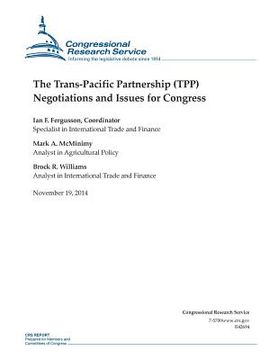The Trans-Pacific Partnership (TPP) Negotiations and Issues for Congress (en Inglés)
Reseña del libro "The Trans-Pacific Partnership (TPP) Negotiations and Issues for Congress (en Inglés)"
The Trans-Pacific Partnership (TPP) is a proposed regional free trade agreement (FTA) being negotiated among the United States, Australia, Brunei, Canada, Chile, Japan, Malaysia, Mexico, New Zealand, Peru, Singapore, and Vietnam. U.S. negotiators and others describe and envision the TPP as a "comprehensive and high-standard" FTA that aims to liberalize trade in nearly all goods and services and include rules-based commitments beyond those currently established in the World Trade Organization (WTO). The broad outline of an agreement was announced on the sidelines of the Asia-Pacific Economic Cooperation (APEC) ministerial in November 2011, in Honolulu, HI. If concluded as envisioned, the TPP potentially could eliminate tariff and nontariff barriers to trade and investment among the parties and could serve as a template for a future trade pact among APEC members and potentially other countries. Congress has a direct interest in the negotiations, both through influencing U.S. negotiating positions with the executive branch, and by considering legislation to implement any resulting agreement. Over the summer, President Obama discussed the possibility of achieving some type of TPP outcome on the sidelines of the November 7-11 APEC meetings, but no major breakthrough was announced. TPP Ministers reported that progress is accelerating and that the number of outstanding issues is limited, but this echoes similar statements made in the past following TPP ministerial meetings. The remaining issues are likely the most sensitive for negotiating parties and may require political-level decisions to be made. The negotiating dynamic itself is complex: for example, decisions on key market access issues on dairy, sugar, and textiles and apparel may depend on the outcome of rules negotiations involving intellectual property rights or state-owned enterprises, among other issues. Over 20 chapters are under discussion in the negotiations. The United States is negotiating market access for goods, services, and agriculture with countries with which it does not currently have FTAs: Brunei, Japan, Malaysia, New Zealand, and Vietnam. Negotiations are also being conducted regarding disciplines on intellectual property rights, trade in services, government procurement, investment, rules of origin, competition, labor, and environment, among other issues. In many cases, the rules being negotiated are intended to be more rigorous than comparable rules found in the WTO. Some topics, such as state-owned enterprises, regulatory coherence, and supply chain competitiveness, may break new ground in FTA negotiations. As the countries that make up the TPP negotiating partners include advanced industrialized, middle income, and developing economies, the TPP, if implemented, may involve restructuring and reform of the economies of some participants. It also has the potential to spur economic growth in the region. As a leading trade policy initiative of the Obama Administration, the TPP serves several strategic goals. It is a manifestation of the Administration's "rebalance" to the Asia-Pacific, and if concluded, may serve to shape the economic architecture of the region. It has the potential to harmonize existing agreements with U.S. FTA partners, attract new participants, and establish regional rules on new policy issues facing the global economy-possibly providing impetus to future multilateral liberalization under the WTO.

